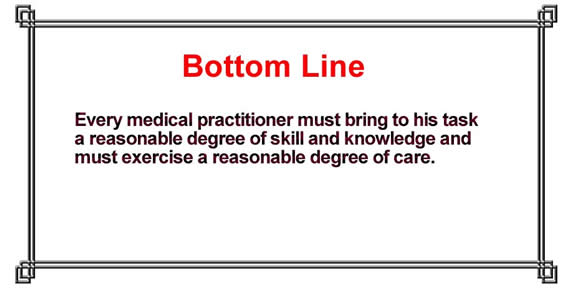Standard of Care
In assessing the standard of care, the court will take into account
- The doctor
- his/her education, experience and qualifications
- The degree of risk involved in the treatment
- The available resources (for example equipment and facilities).
The doctor:
The degree of Risk:
The standard of care is influenced by the risk which is likely to be involved.
As the amount of risk associated with a procedure increases, so does the expected standard of care. The highest standard of care is expected for dangerous or experimental treatments. The patient is entitled to a full disclosure of any attendant risks.
Actions are judged in the light of the knowledge that was available at the time and not in retrospect.
Ter Neuzen v. Korn, [1995] 3 S.C.R. 674
The patient participated in an obstetrician's artificial insemination ("AI") program from 1981 until January 1985, and became infected by HIV as a result of the final AI procedure she underwent. The obstetrician had not warned her of the risk of HIV infection. The first documented case in the world of HIV transmission through AI was published in the lay media in July 1985 and in a medical journal in September 1985.
"Conduct of physicians must be judged in the light of the knowledge that ought to have been reasonably possessed at the time of the alleged act of negligence"
The Available Resources:
The court must consider the circumstances under which the allegedly negligent treatment occurred.
This includes the equipment and facilities.
Facilities:
- Environment in which the care is given.
- Court will have lower expectations re standard of care if facilities are inadequate
- If the doctor has a choice of facilities, then the choice made must be in the best interests of the patient and not self-serving (such as near by because that is more convenient)
As far as circumstances are concerned, the court will take into account:
- The education, experience and qualifications of the doctor
- The degree of risk involved in the treatment
- The equipment, facilities and other available resources
Courts are moving away from the “locality rule” – no longer an absolute defense. Same standard of care is meant to be possible in a rural setting as a city - but in reality this might be difficult to achieve.
Technological advances in communication mean that:
- consultative help is always relatively near
- increased opportunity for ongoing CME training


